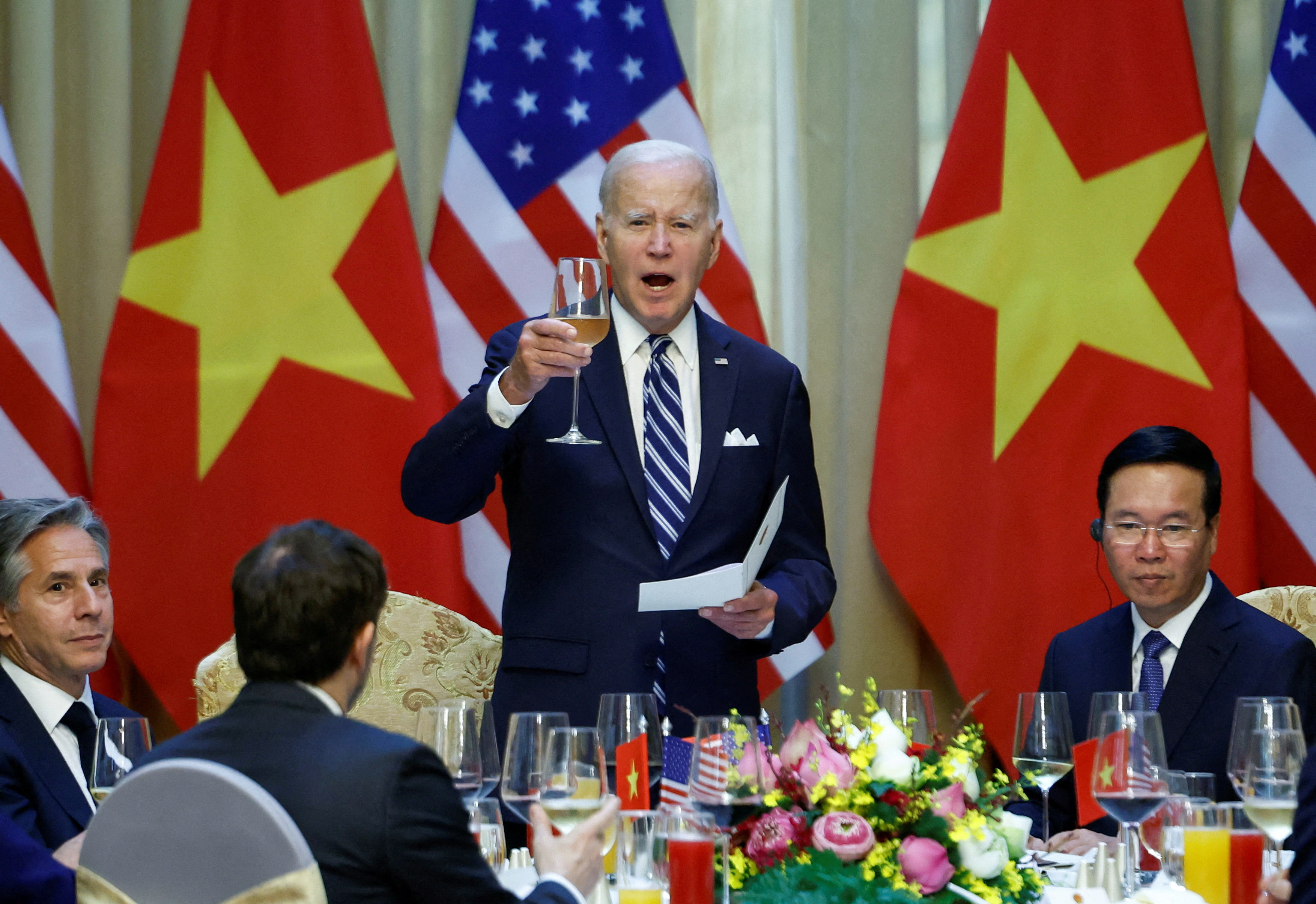Reuters:
Biden accused of sidelining Vietnam and India rights over strategic interests

U.S. President Joe Biden raises a toast with Vietnam's President Vo Van Thuong in Hanoi, Vietnam, September 11, 2023. REUTERS/Evelyn Hockstein Acquire Licensing Rights
WASHINGTON, Sept 11 (Reuters) - The White House fact sheet issued during President Joe Biden's visit to Vietnam weighed in at over 2,600 words. The section on human rights contained just 112 words, including a sub-heading.
From business and strategic perspectives, Biden's visit to Vietnam on Sunday and Monday, and also to India late last week, will likely be seen as bolstering ties with countries that can help Washington counter China's growing might.
But for rights advocates, Biden's travels were a disappointment, given his administration's vow to prioritize human rights when taking office in 2021.
In Hanoi, Biden said the U.S. was elevating relations to a "Comprehensive Strategic Partnership" and deepening cooperation in cloud computing, semiconductors and artificial intelligence. The White House also unveiled a Vietnam Airlines purchase of 50 Boeing 737 Max jets worth $7.8 billion.
Rights advocates fear a lack of focus on human rights, while not unexpected, will not only fail to improve conditions in Vietnam and India, but risk worsening them elsewhere.
"The Biden administration is clearly sidelining human rights in the interest of advancing partnerships with governments it sees as strategically important – and sending a message that the U.S. is willing to tolerate blatant failures to protect and uphold human rights," said Carolyn Nash, Asia advocacy director at Amnesty International.
Rights groups accuse Indian Prime Minister Narendra Modi's ruling Bharatiya Janata Party of systematic discrimination against minorities, particularly Muslims, and its supporters of violent attacks against targeted groups.
Human Rights Watch (HRW) says the government's Hindu majoritarian ideology is reflected in bias in the justice system, and authorities have intensified efforts to silence activists and journalists through politically motivated charges.
HRW said on Saturday Vietnam was holding at least 159 political prisoners – people imprisoned for peacefully exercising basic civil and political rights - and at least 22 others were in detention pending eventual trial before a court controlled by the ruling Communist Party.
In the first eight months of 2023 alone, HRW said, courts sentenced at least 15 people to long prison terms in violation of their rights to a fair trial.
Reporters asked Biden in Vietnam if he was putting U.S. strategic interests above rights and replied: "I’ve raised it (human rights) with every person I met with."
But Nash and John Sifton at HRW said talking in private was not enough.
"It is tremendously difficult to upgrade relationships with rights-abusing governments while also championing human rights issues effectively," Sifton said.
He said governments needed to know there would be consequences for abuses "if not of sticks, then of squandered carrots."
"This is especially true with Vietnam, where the government does not particularly care about its reputation internationally with respect to rights," Sifton said, while adding that it was vital to criticize Modi's rights record publicly as that was the most effective way to push him to change.
Modi denied that discrimination against minorities existed under his government during a press conference with Biden in June. Vietnam's government also denies committing rights abuses.
ADDRESSING RIGHTS "PRIVATELY"
Biden did not publicly raise human rights issues while he was in India, although he told a Hanoi press conference he raised the importance of respecting human rights and a free press in his talks with Modi.
In India, the White House also avoided any public protest over Indian government restrictions on reporters covering Modi's meeting with Biden, which saw the U.S. press corps sequestered in a van while the leaders conversed.
U.S. Indo-Pacific coordinator Kurt Campbell declined to address the press access issue in a briefing with reporters, saying that Biden preferred to address such topics privately.
Campbell said that while India "continues to be a work in progress" on rights, "The key here is for us to maintain a respectful dialogue and to approach some of the challenges with a degree of humility given some of the challenges that we face in our own country."
The White House Hanoi fact sheet said the sides made an "enhanced commitment to meaningful dialogue" in the U.S.-Vietnam Human Rights Dialogue.
Murray Hiebert at Washington's Center for Strategic and International Studies said some U.S. officials see this annual dialogue as an insubstantial exchange of talking points. He also noted that when Vietnamese Communist Party Chief Nguyen Phu Trong held his key meeting with Biden, the closest Vietnamese official to him on his left was To Lam, the powerful minister for state security responsible for crackdowns on dissidents.
Derek Grossman, a regional expert at the RAND Corp, said Biden's primary aim in wooing India and Vietnam was to get them on board with America’s Indo-Pacific strategy to counter China.
"As such, the Biden administration has tended to downplay or avoid human rights discussions," he said. "Doing so certainly emboldens these nations, and others, like Saudi Arabia, to continue business as usual."
Much of the many countries in the world's objections to USA is to insisist on USA "non-interference in the internal affairs of other countries"...
ReplyDeleteNothing wrong if Bidin decides to tread more lightly in leaving India and Vietnam off the hook on their internal matters.
No doubt the reasons are simply to fit US Strategic National priorities.